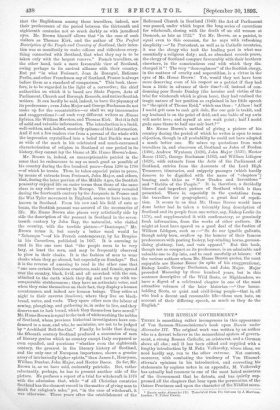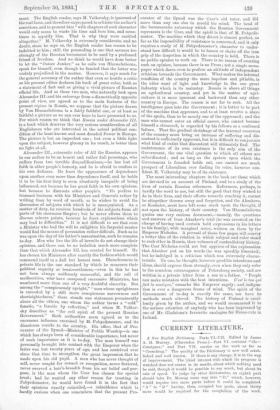THE RUSSIAN GOVERNMENT,* THERE is something rather incongruous in this
appearance of Von Samson-Himmelstierna'a book upon Russia under Alexander III. The original work was written by an author who is a devout believer in the monarchical system of govern- ment, a strong Roman Catholic, an aristocrat, and a German above all else; and it has been edited and supplied with a lengthy introduction by M. Felix Volkovsky, whose ideas, we need hardly say, run to the other extreme. Not content, moreover, with combating the tendency of Von Himmel- stierna's opinions in his introduction, and correcting his statements by copious notes in an appendix, M. Volk-ovsky has actually had recourse to one of the most hated measures of the Government that he detests, and has quietly sup- pressed all the chapters that bear upon the persecution of the Ostsee Provinces and upon the character of the Nihilist move- * Russia under Alexander III. Translated from the German by J, Morrison. London : T. Fisher Unwin. ment. The English reader, says M. Volkovsky, is ignorant of the real facts, and therefore unprepared to criticise the author's assertions, and to present him "with chapters of such character would only mean to waste his time and bore him, and some- times to mystify him. That is why they were omitted altogether." M. Volkovsky is extremely considerate, and no doubt, since he says so, the English reader has reason to be indebted to him ; still, the proceeding is one that savours too strongly of the Russian bureaucrat to be used by a professed friend of freedom. And we think he would have done better to let the " Ostsee Junker," as he calls von Himmelstierna, speak for himself, even though he fancied that the latter was unduly prejudiced in the matter. However, it says much for the general accuracy of the author that even so hostile a critic as his present editor declares his book of great value, both as a statement of fact and as giving a vivid picture of Russian official life. And as these two men, who naturally look upon Alexander III. and his entourage from a diametrically opposite point of view, are agreed as to the main features of the present regime in Russia, we suppose that the picture drawn by Von Himmelstierna is a fairly faithful one, or at least as faithful a picture as we can ever hope to have presented to us. For which reason we think that Russia under Alexander III.
is a book which deserves the very serious consideration of all Englishmen who are interested in the actual political con- dition of the least-known and most dreaded Power in Europe.
The picture is bat an imperfect one ; but even a little light upon the subject, however gloomy in its result, is better than no light at all.
Alexander III., autocratic ruler of All the Russias, appears to our author to be an honest and rather dull personage, who suffers from two terrible disqualifications,—he has lost all faith in other people's honesty, and he is afraid to confess to his own dullness. He fears the appearance of dependence upon another even more than dependence itself, and he holds it to be his first duty to seem absolutely incapable of being influenced, not because he has great faith in his own opinions, but because he distrusts other people's. "He prefers to transact business with his Ministers and Generals rather by writing than by word of mouth, as he wishes to avoid the discussion of subjects with which he is unacquainted. As a matter of duty, he receives hundreds of his subjects from all parts of his enormous Empire ; but he never allows them to discuss minute points, because he fears explanations which may lead to difficulties." It is not difficult to see that even a Minister who had the will to enlighten his Imperial master would find the means of persuasion rather difficult. Such as he was upon the day of his father's assassination, such he remains to-day. Men who live the life of hermits do not change their opinions, and there can be no isolation much more complete than that which Alexander III. has created for himself. He has chosen his Ministers after exactly the fashion which would commend itself to a dull but honest man. Blamelessness in private life is the one standard by ivhich he measures their political sagacity or trustworthiness,—even in this he has not been always uniformly successful, and the roll of mediocrities, who. have composed successive Ministries, has numbered more than one of a very doubtful sincerity. But among the "conspicuously upright," "men whose uprightness is exceeded by a still more conspicuous narrowness and shortsightedness," there stands one statesman prominently above all the others, one whom the author terms a "cold" fanatic, "a fanatic by reflection," and whom M. Volkov- sky describes as "the evil spirit of the present Russian Government." Both authorities seem agreed as to the enormous influence exercised by M. Pobyedonostev, and its disastrous results to the country. His office, that of Pro- curator of the Synod—Minister of Public Worship—is one which has always been of considerable importance, but never of such importance as it is to-day. The man himself was personally brought into contact with the Emperor when the latter was but twenty years of age, and has contrived ever since that time to strengthen the great impression that he made upon his old pupil. A man who has never thought of self, never sought for reward or recognition, never flattered, never swerved a hair's-breadth from his set belief and pur- pose, is the man whom the Czar has chosen for special trust ; had he wanted any other reason for trusting in Pobyedonostev, he would have found it in the fact that their opinions exactly coincided,—a coincidence which is hardly. curious when one remembers that the present Pro- curator of the Synod was the Czar's old tutor, and did, more than any one else to mould his mind. The head of the bureaucratic autocracy which the Russian Government represents is the Czar, and the spirit is that of M. Pobyedo- nostev. The machine which they direct is almost perfect, as far as the impossibility of resistance is concerned, and it only requires a study of M. Pobyedonostev's character to under- stand how difficult it would be to loosen or shake off the iron grip of the despotism in which the country is held. There is no public opinion to work on. There is no means of creating such an opinion, because there is no Press ; not a single news- paper which dares even to profess an attitude of independent criticism towards the Government. What makes the internal condition of the country the more hopeless and pitiable, is the utter want of light and knowledge in the one great industry which is its mainstay. Russia is above all things an agricultural country, and yet in the matter of agri- culture it is more ignorant and backward than any other country in Europe. The reason is not far to seek. All the intelligence goes into the Government ; it is better to be part of the machine that oppresses, and to at least receive a share of the spoils, than to be merely one of the oppressed ; and the man who cannot enter an official career, who cannot become himself a chinovnik, is regarded by his fellows as a confessed failure. That the gradual shrinkage of the internal resources of the country must bring an increase of suffering and dis- content is sufficiently apparent, but it is difficult to conjecture what kind of outlet that discontent will ultimately find. The maintenance of its own existence is the only aim of the Government, the one vital question to which all others are subordinated ; and as long as the system upon which the Government is founded holds out, one cannot see much prospect of Liberalism ever finding its voice, however con- fident M. Volkovsky may be of its existence.
The most interesting chapters in the book are those which are devoted to an account of Finland, and to a study of the lives of certain Russian reformers. Reformers, perhaps, is hardly the word to use, but still the good that they wished to do in their lives, and their efforts towards reaching it, cannot be altogether thrown away and forgotten, and the Aksakovs, or Koshelev, must have left some mark upon the thought, if not upon the , history, of their country. Von Himmelstierna quotes one very curious document,—namely, the questions and answers of Ivan Aksakov's trial (he was arrested on the charge of having used certain bold expressions in his letters to his family), with marginal notes, written on them by the Emperor Nicholas. A perusal of those few pages will convey a better idea of the relation in which subject and ruler stand to each other in Russia, than volumes of contradictory history. The Czar Nicholas could not but approve of the explanation that Aksakov put on his words (he was speedily liberated), but he indulged in a criticism which was extremely charac- teristic. No one, he thought, however good his intentions and ideas, should express them strongly, even when they only refer to the senseless extravagance of Petersburg society, and are written in a private letter from a son to a father. "People can make mistakes with the best intentions. C'esi le ton qui fait la musique," remarks the Emperor sagely ; and indigna- tion is ever a dangerous frame of mind. The spirit of the Government of to-day is exactly the same, nor have its methods much altered. The history of Finland is excel- lently given by the author, and we would recommend it to the serious attention of anybody who has been impressed by one of Mr. Gladstone's favourite analogies for Home-rule in Ireland.



































 Previous page
Previous page